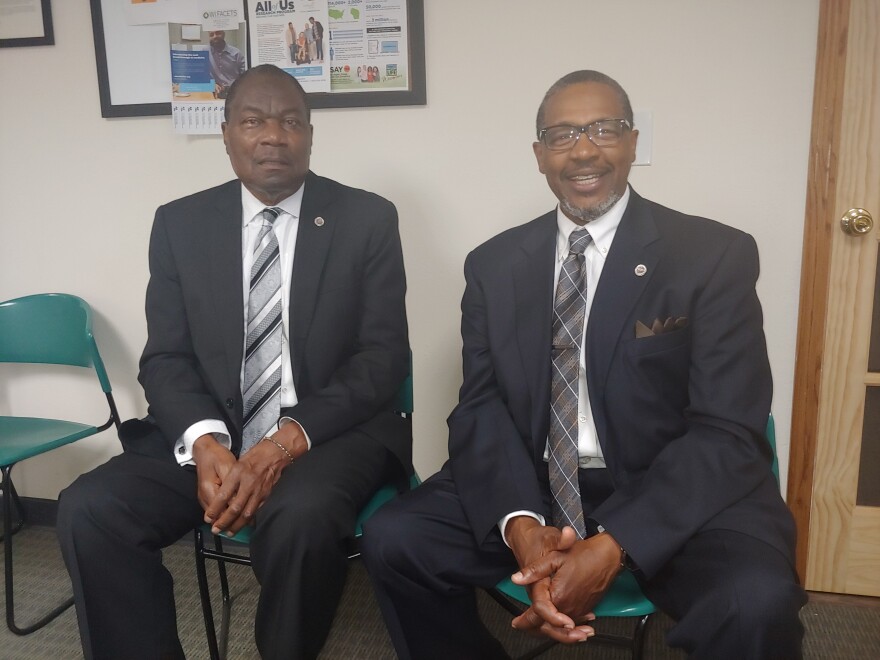A federal program scheduled to spend $60 million in Wisconsin continues to try to get people to share their health and lifestyle information, plus their DNA. The effort known as All of Us has the ambitious goal of enrolling 1 million people nationally, and 33,000 in the greater Milwaukee area.
The promised reward is a $25 enrollment payment and eventually, specialized disease prevention and treatment.
WUWM's Beats Me series recently received a couple questions related to the program.
Beats Me: What Questions Do You Have For WUWM's Beat Reporters?
All of Us is part of the Precision Medicine Initiative, which began during the Obama administration. It's an approach to disease treatment and prevention that looks at people's lifestyle, environment, and biological makeup, including their genetic structure. The thought is that if doctors have a better idea of someone's family health history and gene makeup, the medical community can recommend steps to prevent a disease, find it early, or do a targeted intervention.
Dr. Zeno Franco, of the Medical College of Wisconsin, says All of Us is hoping for diverse participation. "From what are normative research populations, which are kind of white, older males, and really start to broaden that out to include the whole community — African American, Latino, Hmong, ... disabled, LGBT — every different sub-sector of the population has different genetic characteristics," he explains.
Franco cites his family as an example: "I'm Latino. I'm Mexican-American. And my aunt recently said to me, 'I'm not responding well to statins (cholesterol-reducing drugs), as well as they expected. And they think it's because I'm from a Latino background. And my genetics are governing that.' And she was actually encouraging her entire family to get tested for our genes, so we have a better understanding as health care changes how we can use that information to insure, for example, that we don't have a bad reaction to a drug."
Franco says the local goal of signing up 33,000 people by the year 2023 is a huge number, and he hopes for a lot of support.
There are recent signs of interest in some African American neighborhoods.

Last month True Love Outreach Center, on W. Keefe Avenue in Milwaukee, hosted a one-day All of Us pop-up enrollment clinic. The building is part of True Love Missionary Baptist Church.
Pastor Garry Levy says he's signed up, partly out of concern for his own health.
"Some years ago now, I had quadruple heart surgery, and they felt it was genetic on my grandmother's side. And I somewhat wondered why I had a couple of uncles, cousins, the men in the family had somewhat the same thing," he says.
The clinic's location is also partly due to Levy's spouse — Dr. Dessie Levy, who is the director of community engagement for the Medical College's All of Us program.
Dr. Levy says when talking with laypersons she explains the term precision medicine. "It's broken down to the perspective of medicine that's tailored to you, as an individual. Precise, meaning straight to a point. Medicine being a practice," she says.

Dr. Levy says about two dozen people were due to sign up that day, most of them African American clergy.
Pastor Fred Jones of Canaan Baptist Church says he's diabetic. And he says members of his congregation don't always get the best medical care.
"One of the things I hear often is the medication that's prescribed doesn't speak to the issue that they have, and doctors keep trying stuff. So, I think the research is good from that point. There's certainly no harm in doing it," he says.
Questions submitted to Beats Me wondered about the status of the precision medicine initiative, and whether African Americans will be underrepresented in genetic research.
Those questions bear following. But Pastor Jones's spouse, Marian Jones, says despite a long history of government studies abusing African Americans, she's on board with All of Us.
"Well, there's always doubt until proven otherwise, and that's why we have to keep working at putting information out there. So we can turn that doubt into a positive," she says.
However, there is also some uncertainty about precision medicine from other quarters.
Nita Farahany is a professor of law and philosophy at Duke University, and says: "Some reasons some people may not want to participate includes the risk to their privacy. They have to share a lot of genetic information, and it's not clear there are adequate protections in society to protect them against potential misuses."
The Medical College of Wisconsin insists the National Institutes of Health (NIH) has set up strong privacy protections for All of Us.
In fact, at first, the college and other Wisconsin partners — which include Versiti Blood Center of Wisconsin, the University of Wisconsin School of Medicine and Marshfield Clinic Health System — said NIH didn't want them to reveal how many people have signed up for All of Us in Wisconsin.
But then, Marshfield Clinic reported back that the state total is more than 5,000. That would appear to put the Wisconsin effort behind pace for the five-year sign-up period. The sign-up is also lagging nationally. But more outreach efforts are planned this summer, including in the Milwaukee area.

Do you have a question about innovation in Wisconsin that you'd like WUWM's Chuck Quirmbach to explore? Submit it below.
_





